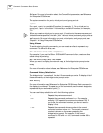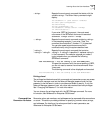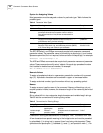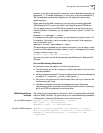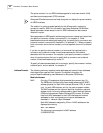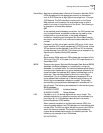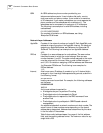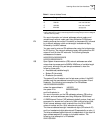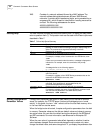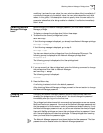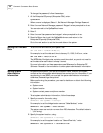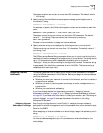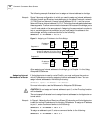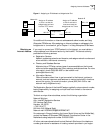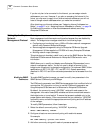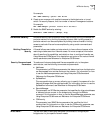
34 CHAPTER 4: CONFIGURING BASIC SETTINGS
Getting Help The user interface provides help menus as memory aids. To display the help menu,
enter a question mark (?). The question mark can be used with different options as
described in Table 7.
Storing Configuration
Parameter Values
Configuration parameters are stored in flash memory or on the disk of another
server (for example, the TFTP/FTP server that boots the bridge/router or tunnel
switch). In this guide, the term “disk” refers to either the local flash memory drive
or the hard disk on another server.
When the bridge/router is booted, it copies configuration parameters from the disk
to memory. Parameter values on the disk are default values and values in memory
are active values. You can alter the default and active values with the SETDefault
and SET commands. For more information, see Reference for Enterprise OS
Software.
When the new value of a parameter takes effect depends on whether its active
value has been changed. Some commands change the active value only, some
change the default value, and some change both. If you display the parameter after
XNS Consists of a network address followed by a MAC address. The
network address distinguishes between different XNS Ethernet
networks. It contains eight hexadecimal digits, and is preceded by an
ampersand (&), which is used for identification. Leading zeros can be
omitted. The following addresses are the same:
&3333%080002001326
&00003333%080002001326
Table 7 Online Help Syntax Summary
Syntax Description
? Displays the help menu. Different commands are displayed de-
pending on whether Network Manager privilege or User privilege is in
effect. The commands are organized according to services.
-? Displays a list of services.
-service? Displays a list of commands within the service.
For example, to display a list of commands in the SYS Service, enter:
-SYS?
If there are no commands under the service, a message is displayed to
indicate this. For example, enter this command at the prompt:
-IDP?
A message similar to the following appears:
No commands available in IDP service
command -service? Displays a list of parameters that can be used with the command
within the service.
For example, to display a list of PORT Service parameters that can be
used with the SETDefault command, enter:
SETDefault -PORT?
command ? Displays parameters by service name that can be used with the
command. Only parameters in services specified by the
CurrentServices parameter are displayed.
command -service
parameter?
Displays syntax for the command used with the parameter.
For example, to display the syntax for the SETDefault command used
with the CONTrol parameter in the SNMP Service, enter:
SETDefault -SNMP CONTrol?



